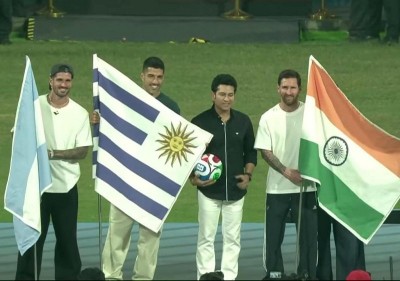
New playing conditions come into effect from Pakistan-Australia series: ICC
"It is important to note that the playing conditions are applicable to international cricket and must be read together with the Laws of Cricket. Whilst a playing condition may affect the Laws of Cricket as they may apply to international cricket, these changes are not amendments to the Laws of Cricket themselves," the ICC said in a statement.
A playing condition has been added to provide clarification on the ground movement/action of a player/player support personnel who has been suspended in accordance with the ICC Code of Conduct for Players and Player Support Personnel (Clause 1.2).
Clause 2.2 of the playing conditions has been amended to provide for the following:
2.2.1 The player shall not be permitted to bowl in the match until he has either been able to field, or his team has subsequently been batting, for the total length of playing time for which he was absent (hereafter referred to as penance time), subject to a maximum cumulative penance time of 120 minutes. If any unexpired penance time remains at the end of an innings, it is carried forward to the next and subsequent innings of the match.
2.2.2 The player shall not be permitted to bat in the match until his team’s batting innings has been in progress for the length of playing time that is equal to the unexpired penance time carried forward from the previous innings, subject to a maximum cumulative penance time of 120 minutes. However, once his side has lost five wickets in its batting innings, he may bat immediately. If any unexpired penance time remains at the end of that batting innings, it is carried forward to the next and subsequent innings of the match.
The ICC introduced a protocol last year that required the match umpires to consult with the match referee before making any decision to abandon play. This has now been formalised in Clause 3.5.3 (b), which has been further amended to deal with the effects of dew that has the potential to affect the contest, particularly in night T20s and day-night ODIs.
The following has been added: “If circumstances are warranted, the umpires shall stop play and instruct the ground staff to take whatever action they can and use whatever equipment is necessary to remove as much dew as possible from the outfield when conditions become unreasonable or dangerous. The umpires may also instruct the ground staff to take such action during scheduled and unscheduled breaks in play”.
The trial regulation allowing an 80-over top-up of unsuccessful DRS player reviews has been extended for another 12 months (Clause 3.5), while Real-Time Snickometer has been included in the ICC List of Approved Technology (Clause 3.7).
A T20I innings has been increased from 80 minutes to 85 minutes and minimum over-rate to be achieved will be 14.11 (Clause 16).
Support Our Journalism
We cannot do without you.. your contribution supports unbiased journalism
IBNS is not driven by any ism- not wokeism, not racism, not skewed secularism, not hyper right-wing or left liberal ideals, nor by any hardline religious beliefs or hyper nationalism. We want to serve you good old objective news, as they are. We do not judge or preach. We let people decide for themselves. We only try to present factual and well-sourced news.






